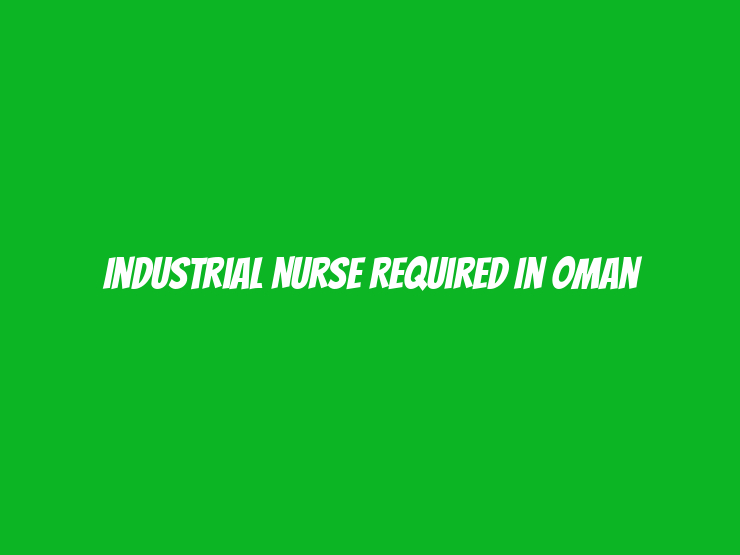An Industrial Nurse, also known as an Occupational Health Nurse, is responsible for ensuring the health and safety of employees in a workplace setting, particularly in industrial or manufacturing environments. They provide medical care, assess workplace hazards, promote employee wellness, and implement safety and health policies to prevent workplace injuries and illnesses. Industrial Nurses play a vital role in creating a safe and healthy work environment, addressing both immediate medical concerns and long-term health risks associated with industrial work.
Dua for Job Seeking: اللهم يسر ولا تعسر واكمل ولا تكل وبارك لي فيما قَدَّرت
| Salary | Market Competitive |
| Experience | 3 – 8 years |
| Location | Oman |
| Qualification | Bachelor of Science(Nursing), Master of Science(Nursing) |
| Posted | 09 October 2024 |
| Job Type | Full-Time |
| Posted by | Habeebi Recruiter |
| last date to apply | apply within 15 days of posting |
Key Responsibilities
1. Medical Care and First Aid
One of the primary responsibilities of an Industrial Nurse is to provide first aid and emergency medical care to employees who suffer injuries or illnesses while on the job. They assess the severity of medical issues, administer treatment, and determine whether additional medical attention is required. This includes handling minor injuries, such as cuts, burns, and sprains, as well as responding to more serious incidents like accidents or exposure to hazardous substances.
2. Health Assessments and Screening
Industrial Nurses perform routine health assessments and screenings for employees. This may include conducting pre-employment health checks, monitoring vital signs, and assessing workers’ overall fitness for the job. In industries where employees are exposed to physical, chemical, or biological hazards, regular health screenings help identify potential health issues early, ensuring that employees are fit for duty and reducing the risk of work-related illnesses.
3. Workplace Hazard Identification
An important aspect of the Industrial Nurse’s role is identifying and assessing workplace hazards that could potentially harm employees. They work closely with safety officers and management to conduct inspections and monitor working conditions. Industrial Nurses provide insights into the physical demands of different tasks, the use of protective equipment, and exposure to harmful chemicals or materials, helping to ensure compliance with occupational safety regulations.
4. Health and Safety Training
Industrial Nurses are responsible for educating employees about workplace health and safety. They may conduct training sessions on topics such as proper lifting techniques, use of personal protective equipment (PPE), ergonomics, and emergency response procedures. By educating employees on safe practices, Industrial Nurses help reduce the risk of injury and promote a culture of health and safety within the organization.
5. Employee Wellness Programs
Promoting overall employee wellness is a key responsibility of an Industrial Nurse. This includes implementing programs focused on physical fitness, mental health, nutrition, and stress management. Industrial Nurses often collaborate with human resources and management to create wellness initiatives that enhance the health and well-being of the workforce, such as smoking cessation programs, flu vaccination drives, and mental health awareness workshops.
6. Case Management and Rehabilitation
For employees who are injured or suffer from work-related illnesses, Industrial Nurses play a critical role in managing their recovery. They oversee case management, coordinate with healthcare providers, and help injured employees return to work safely. This may include creating return-to-work plans, monitoring progress, and making adjustments to job duties to accommodate any physical limitations during the recovery period.
7. Record Keeping and Reporting
Industrial Nurses are responsible for maintaining accurate records of medical care, health assessments, and workplace incidents. This includes documenting injuries, illnesses, and treatments, as well as reporting workplace accidents and hazardous conditions to management and relevant authorities. These records are essential for tracking trends, identifying areas for improvement in workplace safety, and ensuring compliance with health and safety regulations.
8. Collaboration with Management and Safety Teams
Industrial Nurses work closely with management, safety officers, and human resources to ensure that the company’s health and safety policies are being implemented effectively. They provide expert advice on workplace health issues, contribute to safety audits, and participate in the development of health and safety protocols. Their role is essential in promoting a proactive approach to health and safety management.
Skills and Qualifications
To succeed as an Industrial Nurse, a strong foundation in nursing and occupational health is essential. A nursing degree and relevant licensure (such as an RN license) are required, along with additional certifications in occupational health, safety, or emergency response. Industrial Nurses should have a deep understanding of workplace safety regulations, excellent assessment and decision-making skills, and the ability to manage medical emergencies in a high-pressure environment.
Good communication and interpersonal skills are also critical, as Industrial Nurses must interact with employees, management, and safety teams regularly. They should be compassionate, detail-oriented, and able to maintain confidentiality regarding employee health issues. Experience in industrial or occupational settings is an advantage, as it helps nurses navigate the specific health challenges associated with such environments.
How to apply:
Send your updated resume to our email or directly reach us at our phone:
Email: enquiry@alnabaservices.com
Telephone: +968 80076565
Disclaimer:
- We list jobs submitted by employers. HabeebiRecruiter.com does not verify employers or guarantee job details.
- Be aware: legitimate jobs never require upfront payment
